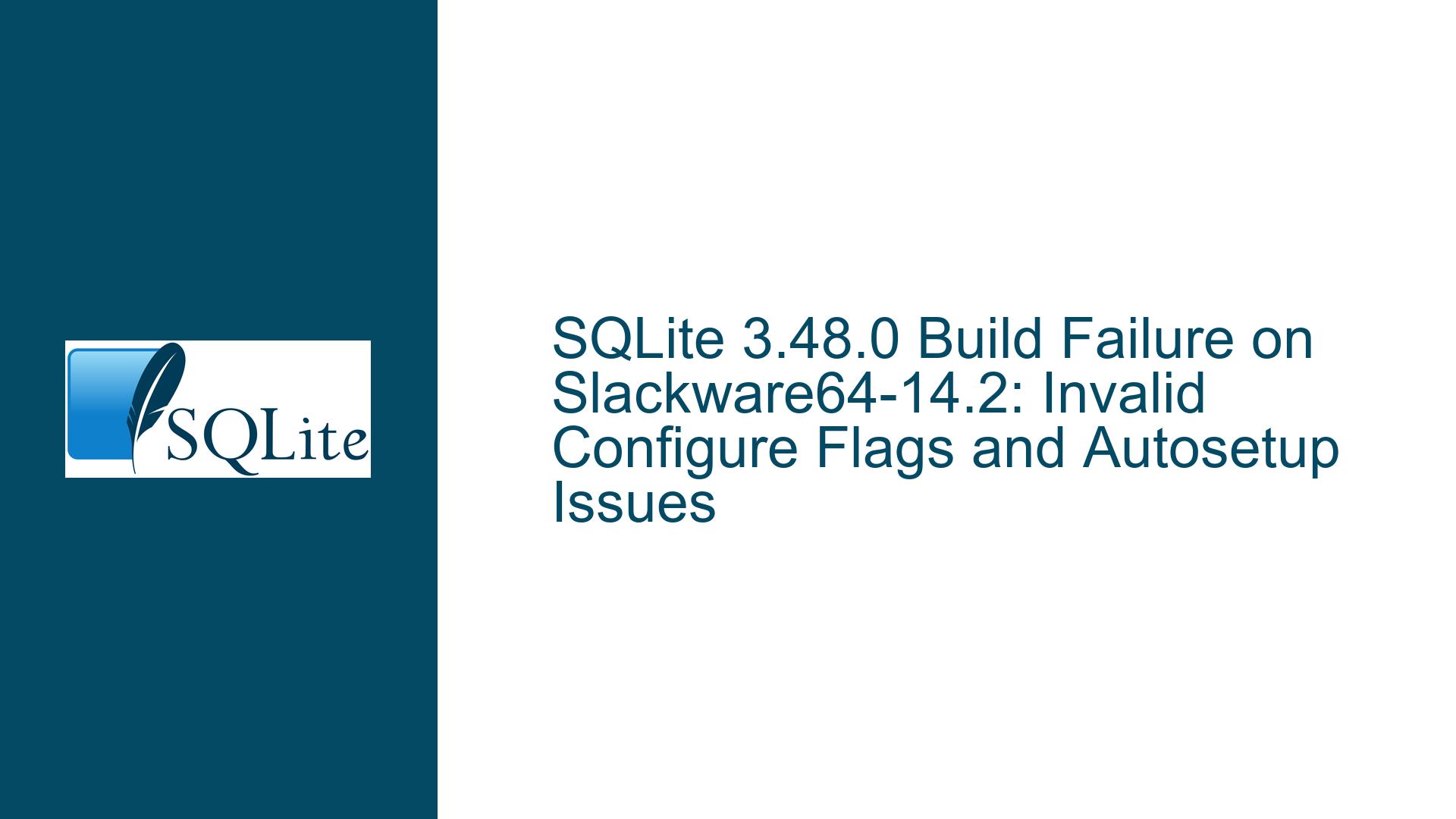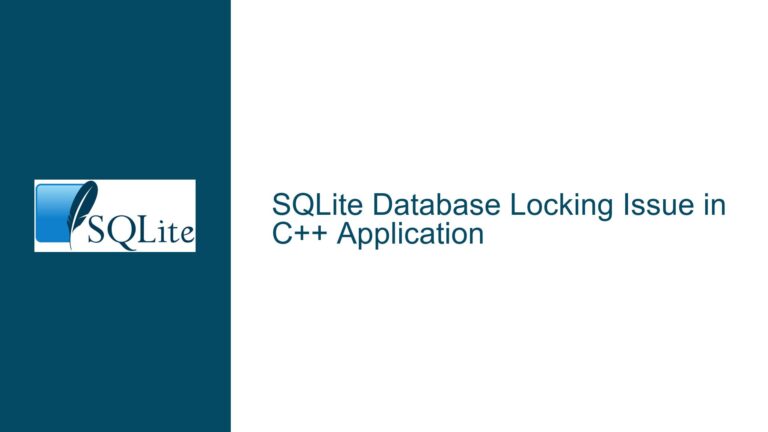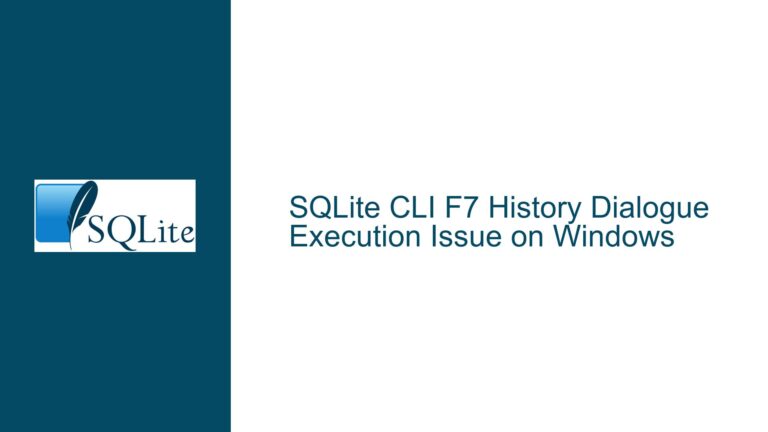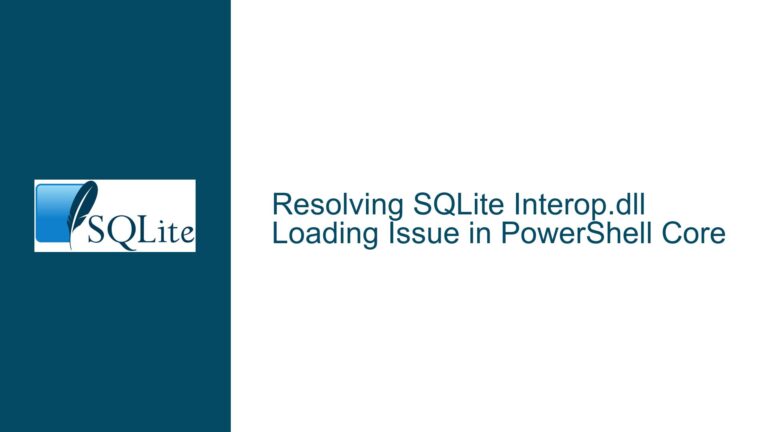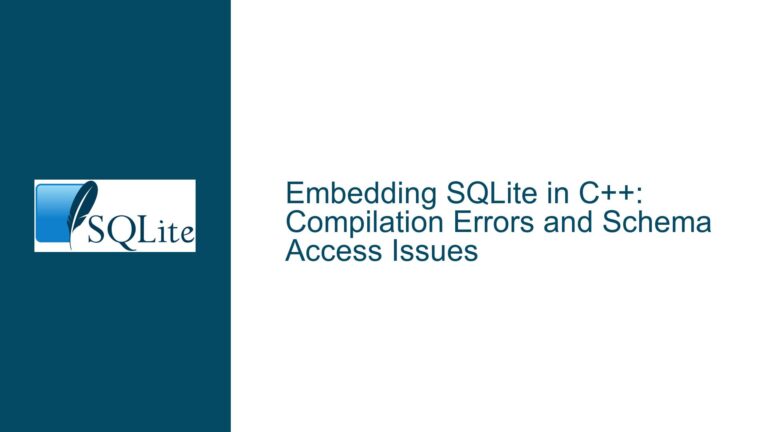SQLite 3.48.0 Build Failure on Slackware64-14.2: Invalid Configure Flags and Autosetup Issues
Issue Overview: Build Failure Due to Invalid Configure Flags and Autosetup Misconfiguration
The core issue revolves around a build failure of SQLite version 3.48.0 on Slackware64-14.2, specifically when using a long-standing build script that previously worked without issues. The failure is triggered by the presence of invalid or outdated configure flags in the build script, which are no longer supported or have been renamed in the newer version of SQLite. The primary error message indicates that the flag --cross-thread-connections is unrecognized, and additional flags such as --enable-tempstore=no and --enable-static are also problematic. These flags are either deprecated, renamed, or have specific requirements that are not being met in the current build environment.
The build system in question uses autosetup, a configuration tool that enforces strict rules for flag naming and usage. Specifically, autosetup reserves the prefixes --enable- and --disable- exclusively for boolean flags, and it enforces that all flags with these prefixes must be boolean. This enforcement has led to the renaming of certain flags, such as --enable-tempstore, which is now --with-tempstore. Additionally, the build system may implicitly override certain flags, such as --disable-static, if other components require a static library for their functionality.
The issue is further complicated by the fact that the build script relies on a specific version of the autosetup toolchain, and discrepancies between the local environment and the "One True Version" used by the SQLite project can lead to inconsistent behavior. For example, some environments may treat unknown flags as non-fatal warnings, while others may fail fatally. This inconsistency can make it difficult to diagnose and resolve build issues, especially when working with third-party build scripts or custom configurations.
Possible Causes: Deprecated Flags, Autosetup Constraints, and Environment Inconsistencies
The build failure can be attributed to several interrelated causes, each of which must be carefully examined to fully understand and resolve the issue.
Deprecated or Renamed Configure Flags: The most immediate cause of the build failure is the presence of invalid or outdated configure flags in the build script. The flag
--cross-thread-connectionsis explicitly mentioned as unrecognized, and it is confirmed that this flag has never been part of the SQLite source tree. This suggests that the flag may have been introduced by a third-party build script or custom configuration that is no longer compatible with the current version of SQLite. Similarly, the flag--enable-tempstore=nohas been renamed to--with-tempstoredue to constraints imposed byautosetup, which reserves the--enable-and--disable-prefixes for boolean flags. The flag--enable-staticmay also be problematic, as it can be implicitly overridden by other components that require a static library.Autosetup Constraints and Flag Enforcement: The
autosetuptoolchain used by SQLite enforces strict rules for flag naming and usage, which can lead to build failures if these rules are not followed. Specifically,autosetuprequires that all flags with the--enable-and--disable-prefixes be boolean, and it will fail fatally if non-boolean flags are used with these prefixes. This enforcement has led to the renaming of certain flags, such as--enable-tempstore, which is now--with-tempstore. Additionally,autosetupmay implicitly override certain flags, such as--disable-static, if other components require a static library for their functionality. This behavior can be confusing and difficult to diagnose, especially when working with complex build scripts or custom configurations.Environment Inconsistencies and Autoconf Versioning: Another potential cause of the build failure is inconsistencies between the local build environment and the "One True Version" of
autosetupused by the SQLite project. The SQLite project relies on a specific, ancient version ofautoconfto generate the configure script, and discrepancies between this version and the local version can lead to inconsistent behavior. For example, some environments may treat unknown flags as non-fatal warnings, while others may fail fatally. This inconsistency can make it difficult to diagnose and resolve build issues, especially when working with third-party build scripts or custom configurations. Additionally, regenerating the configure script with a local version ofautoconfcan introduce further inconsistencies, as the local version may behave differently than the version used by the SQLite project.
Troubleshooting Steps, Solutions & Fixes: Resolving Build Failures and Ensuring Compatibility
To resolve the build failure and ensure compatibility with SQLite 3.48.0, the following steps should be taken:
Identify and Remove Invalid Configure Flags: The first step in resolving the build failure is to identify and remove any invalid or outdated configure flags from the build script. Specifically, the flag
--cross-thread-connectionsshould be removed, as it is not recognized by the SQLite source tree. Additionally, the flag--enable-tempstore=noshould be replaced with--with-tempstore=no, as the former has been renamed due to constraints imposed byautosetup. The flag--enable-staticshould also be examined, as it may be implicitly overridden by other components that require a static library. If the inverse flag--disable-staticis not being honored, this is a known issue and may require additional investigation.Update the Build Script to Reflect Renamed Flags: Once the invalid flags have been removed, the build script should be updated to reflect any renamed or deprecated flags. Specifically, the flag
--enable-tempstore=noshould be replaced with--with-tempstore=no, and any other flags that have been renamed or deprecated should be updated accordingly. Additionally, the build script should be reviewed to ensure that all flags comply with the constraints imposed byautosetup, such as the requirement that all flags with the--enable-and--disable-prefixes be boolean.Ensure Consistency with the "One True Version" of Autosetup: To avoid inconsistencies between the local build environment and the "One True Version" of
autosetupused by the SQLite project, it is important to ensure that the local environment is configured to use the same version ofautoconfandautosetupas the SQLite project. This may require downloading and installing the specific version ofautoconfused by the SQLite project, or using a pre-configured build environment that matches the SQLite project’s requirements. Additionally, the configure script should not be regenerated with a local version ofautoconf, as this can introduce further inconsistencies and lead to build failures.Test the Build Script in a Clean Environment: Once the build script has been updated and the local environment has been configured to match the SQLite project’s requirements, the build script should be tested in a clean environment to ensure that it works as expected. This may involve setting up a virtual machine or container with a clean installation of Slackware64-14.2 and the required build tools, and then running the build script to verify that it completes successfully. If the build still fails, additional debugging may be required to identify and resolve any remaining issues.
Consult the SQLite Documentation and Community: If the build script continues to fail after following the above steps, it may be helpful to consult the SQLite documentation and community for additional guidance. The SQLite website provides detailed documentation on the build process, including a list of supported configure flags and their usage. Additionally, the SQLite community, including forums and mailing lists, can be a valuable resource for troubleshooting build issues and obtaining advice from experienced users and developers.
By following these steps, the build failure can be resolved, and the build script can be updated to ensure compatibility with SQLite 3.48.0. This will allow the build process to proceed smoothly and ensure that the resulting binary is fully functional and optimized for the target environment.
This guide provides a comprehensive overview of the issue, its possible causes, and detailed troubleshooting steps to resolve the build failure. By carefully following these steps, users can ensure that their build scripts are compatible with the latest version of SQLite and avoid common pitfalls associated with deprecated flags and environment inconsistencies.
